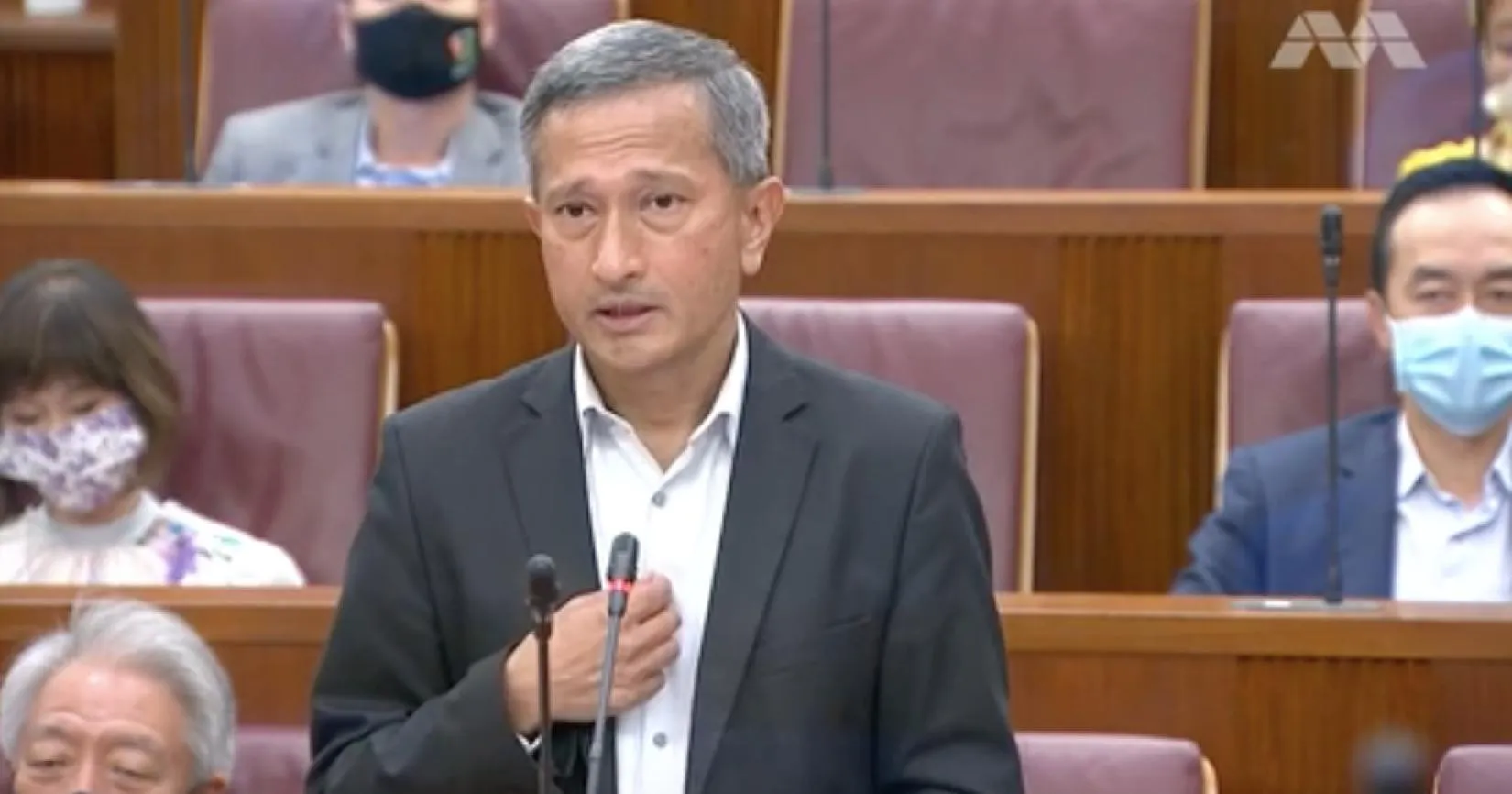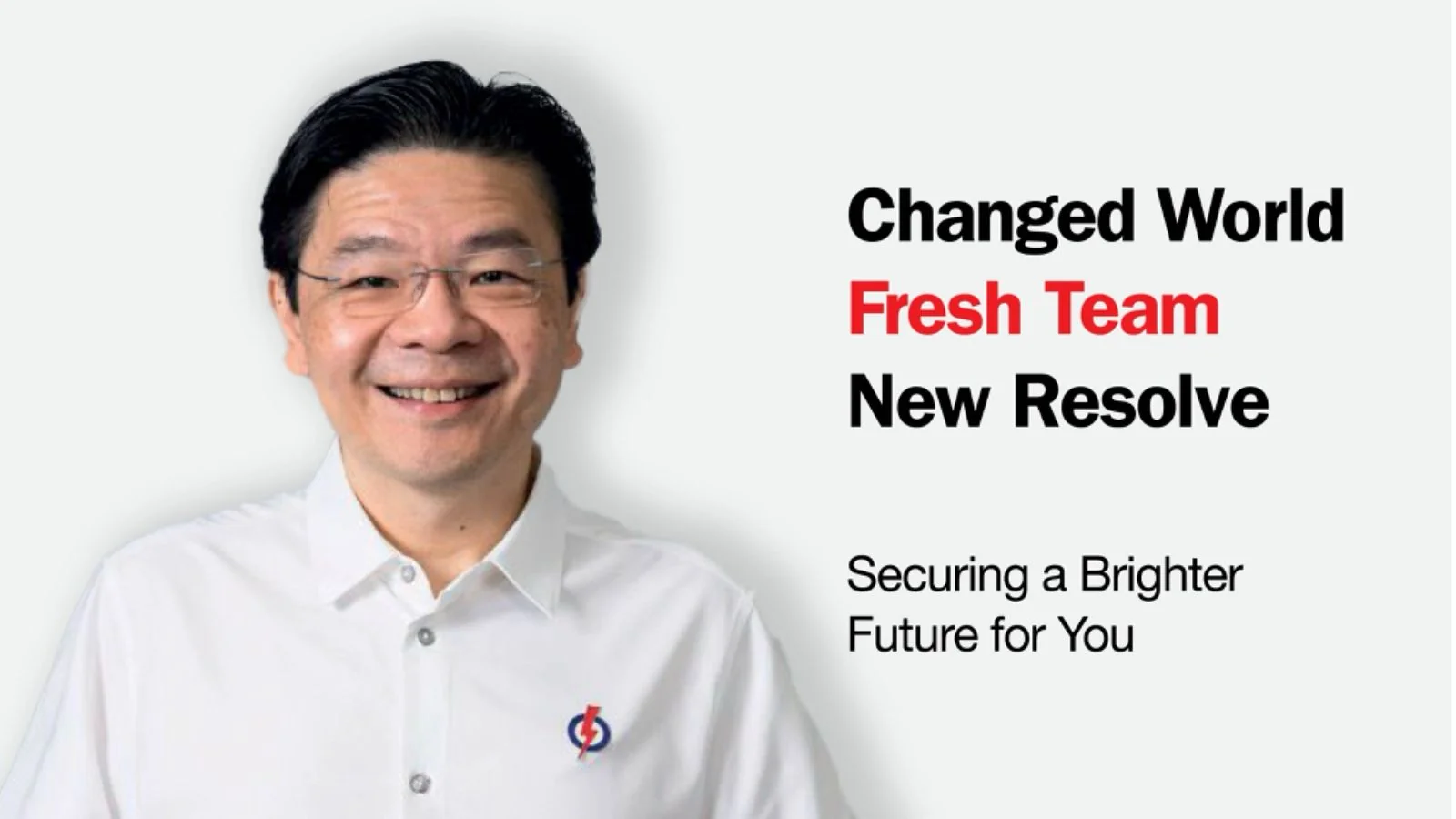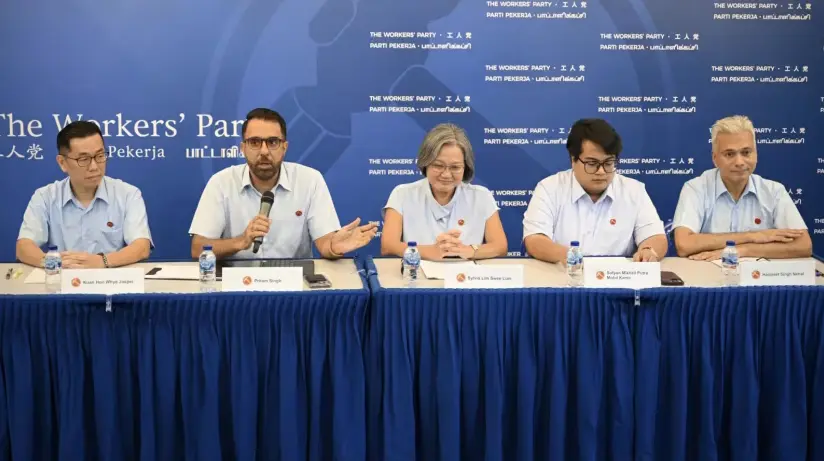维文:新加坡之所以情况更好,是因为抗疫措施不像其他国家那样政治化
反对党领袖毕丹星鼓励新加坡人下载并使用TraceTogether。

反对党领袖毕丹星鼓励新加坡人下载并使用TraceTogether。

China aims to dominate ASEAN by leveraging Singapore’s diplomatic influence and cultural ties, while Israel seeks to preserve its strategic alliance with Singapore - one of very few countries still allied with Israel in ASEAN.

Disclaimer: This analysis is a speculative exploration based on geopolitical trends, historical patterns, and open-source intelligence.
Foreign interference isn’t a conspiracy theory; it’s a global reality, from Russia’s 2016 U.S. election hacks to China’s whispered influence in Australia.
Singapore, a tiny island with outsized influence, is a high-value target. Its role as a global financial hub, with approximately S$5.4 trillion in assets under management makes its electoral outcome a matter of international consequence.
China, Singapore’s largest trading partner with S$150 billion in bilateral trade in 2022, has strong incentives to influence GE2025.
As ASEAN’s diplomatic anchor, Singapore influences regional policies critical to China’s Belt and Road Initiative and South China Sea claims.
A government aligned with Beijing would enhance its dominance in Southeast Asia, where Singapore’s neutrality is a linchpin.
Moreover, Singapore’s military training partnerships with Taiwan make it a target for China’s efforts to suppress Taiwanese independence narratives.
Past disinformation campaigns
China has a well-documented history of disinformation:
Taiwan: Beijing has used deepfakes and propaganda to discredit Taiwanese leaders and deter voters from supporting independence, targeting Chinese-speaking communities to sow division, as reported by regional security experts.
Philippines: China has promoted narratives portraying itself as a constructive regional actor while casting doubt on U.S. reliability, aiming to weaken U.S.-Philippine ties, per the Center for Strategic and International Studies.
Singapore (2017): A notable incident involved Huang Jing, a U.S. citizen and academic at the Lee Kuan Yew School of Public Policy, who was expelled in August 2017 for acting as an agent of influence for a foreign country, widely understood to be China. Huang used his position to share privileged information with foreign intelligence operatives and attempted to influence Singapore’s foreign policy, per MHA.
Potential impact in Singapore
Singapore’s 74% ethnic Chinese population and economic ties with China create vulnerabilities to disinformation.
AI-generated deepfakes on platforms like Meta and Tiktok could depict candidates disparaging Chinese culture, alienating voters.
Cyber operations might target journalists of alternative and mainstream media outlets, while covert funding through Chinese business networks or clan associations could support pro-China candidates.
The October 2024 deepfake video targeting former President Halimah Yacob, falsely showing her criticizing the government, underscores this threat.
The 2020 case of Dickson Yeo, a Singaporean sentenced in the U.S. for spying for Chinese intelligence, further highlights Beijing’s use of local operatives, though Yeo claimed no disloyalty to Singapore.
Why Singapore?
Singapore’s diplomatic leadership in ASEAN and military ties with Taiwan make it a strategic target.
China’s ambition to dominate ASEAN relies on influencing key players like Singapore, whose neutral stance could shift regional dynamics if manipulated.
Disinformation could erode public trust or promote candidates aligned with Beijing’s goals.
Israel, a key defense partner supplying Singapore with technologies like the Iron Dome, seeks to maintain a government supportive of bilateral ties.
As one of Singapore’s few ASEAN allies alongside Thailand, and with neighbors like Malaysia and Indonesia holding anti-Israel stances, Singapore’s pro-Israel policies are crucial.
A change in government could disrupt defense cooperation or weaken Israel’s Southeast Asian foothold, where Singapore is a diplomatic and technological hub.
Past disinformation campaigns
Israel’s disinformation efforts, particularly since the Gaza war, have aimed to shape global narratives:
U.S. Lawmakers (2024): Israel funded a $2 million campaign through Stoic, a Tel Aviv-based firm, using 600 fake social media accounts to target 128 U.S. Congresspeople with pro-Israel messaging. Active as of June 2024, it employed AI tools like ChatGPT and fake news sites to attack UNRWA and influence policy (The New York Times, June 2024).
Gaza War propaganda: AI-driven bot farms spread false narratives to dehumanize Palestinians and pressure policymakers, as reported by The Intercept in February 2024 (Gaza: Israel, Netanyahu, propaganda, lies, Palestinians).
Meta censorship: Israel secured the removal of 38.8 million pro-Palestinian posts on Meta platforms by April 2025, aligning with efforts to suppress criticism (Dropsite News).
Specific falsehoods: Misleading claims, such as audio evidence in the Gaza Baptist Hospital massacre, highlight tactical disinformation (Euronews, February 2024).
Potential impact on Singapore
Israel’s cyber capabilities, exemplified by tools like Pegasus and Graphite used in Singapore pose a threat.
While the 2024 Graphite spyware from Paragon Solutions was reportedly halted, Israel’s history with Pegasus—sold to various governments—suggests that comparable tools remain active.
Disinformation campaigns might target Singapore’s Malay-Muslim community (15% of the population) to counter anti-Israel sentiments, using bots on platforms like Meta.
Covert lobbying through defense or tech partnerships could subtly influence policy.
Why Singapore?
Singapore’s status as a rare ASEAN ally makes it a linchpin for Israel’s regional strategy.
A pro-Israel government ensures sustained defense cooperation and counters regional hostility.
Disinformation could protect these ties by shaping elite perceptions or neutralizing anti-Israel narratives.
Singapore has fortified its electoral process against disinformation:
Foreign Interference (Countermeasures) Act 2021 (FICA): Enables authorities to remove false content and scrutinize foreign funding, countering China’s deepfakes and Israel’s bot campaigns Countering Foreign Interference.
Cybersecurity: The Cyber Security Agency (CSA) secures electoral systems, with 2023 advisories promoting robust digital protections Advisory to Presidential Election Candidates.
Public resilience: Media literacy campaigns and high public trust (84% in government, 2023 Edelman Trust Barometer) equip citizens to identify disinformation Commentary: What Singapore can do more against rising threat of foreign interference.
The FICA law was in the news recently when four members of one of Singapore's richest families were designated as "politically significant persons" for their membership to a China political advisory body. MHA had emphasised that the four individuals had not engaged in any “egregious activity”. As such, their designation can be seen as a pre-emptive move to guard against any potential vulnerabilities to foreign interference.
Also last year, FICA was invoked to block 95 social media accounts linked to self-exiled Chinese billionaire Guo Wengui, the first time that the account restrictions directions under FICA were being deployed.
China aims to dominate ASEAN by leveraging Singapore’s diplomatic influence and cultural ties, while Israel seeks to preserve its strategic alliance.
Singapore’s FICA, cybersecurity, and public resilience provide a strong defense, but sustained vigilance is critical.
Enhanced cyber audits, monitoring of foreign networks, and public education will ensure Singapore’s vote remains untainted.
As GE2025 approaches, the nation’s commitment to sovereignty will determine its success in countering these threats.
PAP manifesto focuses on economic growth, education, social support, healthcare, housing, sustainability, arts, and social cohesion, with detailed initiatives in each area.

The People's Action Party (PAP) launched their manifesto last Thursday (Apr 17), titled "Changed World, Fresh Team, New Resolve – Securing a Brighter Future for You."
Manifesto focuses on economic growth, education, social support, healthcare, housing, sustainability, arts, and social cohesion, with detailed initiatives in each area.
Here are the key points:
The PAP, as the ruling party, launched its manifesto on April 17, 2025, titled "Our Manifesto, Our Promise," at Infinite Studios. Prime Minister Lawrence Wong emphasized navigating global changes and defending Singapore's interests. Key proposals include:
Education is framed as a cornerstone for future success, with a focus on inclusivity and lifelong learning:
This pillar aims to build a flexible and inclusive education system, though challenges may arise in scaling these initiatives effectively.
Social support is a critical focus, aiming to uplift vulnerable groups and ensure inclusivity:
These measures aim to create a more inclusive society, though their impact may vary based on funding and community uptake.
Healthcare initiatives are designed to cover the entire lifespan, ensuring comprehensive care:
These initiatives aim to build a robust healthcare system, though challenges may include workforce retention and funding sustainability.
Housing remains a priority, addressing both supply and quality of living:
These efforts aim to ensure affordable and quality housing, though market dynamics may pose implementation challenges.
Sustainability is a key focus, balancing urban development with environmental care:
These initiatives aim to create a sustainable urban environment, though their success may depend on community engagement and funding.
Arts and culture are highlighted as vital for quality of life and national identity:
These efforts aim to enrich cultural and sporting life, though their impact may vary based on public participation.
Social cohesion is framed as essential for national unity and resilience:
These measures aim to build a united and engaged society, though their effectiveness may depend on community buy-in.
| Pillar | Key Initiative | Target Beneficiaries |
|---|---|---|
| Economic Growth | Adopt AI and clean energy | Businesses, PMETs |
| Education | Build 4 new SPED schools by 2030 | Students with special needs |
| Social Support | Extend Progressive Wages to more sectors | Lower-wage workers |
| Healthcare | Add 13,600 new hospital beds in 5 years | General population |
| Housing | Build 50,000 new HDB flats in 3 years | Home seekers |
| Sustainability | Create 25 new parks | Residents, environmentalists |
| Arts and Culture | Expand SG Culture Pass | Arts enthusiasts |
| Social Cohesion | Enhance integration efforts | New citizens, diverse groups |
新加坡反对党堡垒的底气与隐忧

根据《海峡时报》专访,工人党新人哈普雷特·辛格(Harpreet Singh)近日坦言,不愿被“空降”至“安全选区”。此言如石投湖面,激起涟漪,揭示了工人党对后港和阿裕尼等选区坚如磐石的自信,暗示其内部对这些传统票仓的掌控力。
哈普雷特的表态证实了外界长期的猜测:在人民行动党(PAP)主宰的新加坡政坛,后港选区(自1991年起为工人党根据地)和阿裕尼集选区(2011年夺下)堪称反对党的“铁打营盘”。2020年大选(GE2020)中,工人党在后港赢得61.2%的选票,阿裕尼集选区得票率达59.9%。虽非压倒性胜利,但在人民行动党(上届93席中占83席)的绝对优势下,这份选民忠诚度无疑是一股不容小觑的力量。
然而,工人党秘书长普里坦·辛格(Pritam Singh)却频频警告反对党可能“全军覆没”,正如《亚洲新闻台》今年初报道所述。这番危言耸听的论调,与哈普雷特的乐观表态形成鲜明对比,令人不禁质疑其真实意图。
普里坦在呼吁党内团结时反复提及“全军覆没”的风险,表面上是为激励支持者,防止自满情绪滋生。他将选举塑造成一场生死存亡的较量,意在确保工人党支持者——尤其是在后港与阿裕尼等关键选区——踊跃投票。这种“恐惧动员”在新家坡政坛并不陌生,堪称政治教科书中的经典一招。
然而,这柄双刃剑暗藏风险。哈普雷特对“安全选区”的坦率承认,暗示工人党私下对核心选区的稳固地位信心十足。公开渲染“全军覆没”的危机,难免让敏锐的选民嗅到一丝虚伪的气息。在新加坡这个以务实著称的城邦,选民对政治话术的洞察力不容小觑。若他们察觉工人党夸大风险以操控舆论,这种“公信力货币”本就稀缺的政党恐将陷入信任危机。
更棘手的是,普里坦自身的诚信风波为其言论蒙上阴影。今年早些时候,他因在国会特权委员会(Committee of Privileges)作伪证被判两项罪名成立。案件源于他处理前国会议员拉希莎·汗(Raeesah Khan)2021年在国会谎称陪同性侵受害者报警一事的失当行为。这场风波令普里坦的公信力备受考验,也让他的“全军覆没”论调更显牵强。
普里坦绝非政坛新手。作为律师、国会议员及深耕新加坡政坛多年的老将,他的“全军覆没”论并非出于对后港或阿裕尼选情的真正担忧,而是精心设计的动员策略。在选民冷漠情绪可能滋生的岛国,点燃支持者的危机感是政治动员的入门课。
然而,过犹不及。过度渲染弱势地位,恐有“狼来了”之虞。正如哈普雷特所暗示,若工人党的核心选区稳如泰山,普里坦的末日论调可能适得其反,侵蚀选民信任。在新加坡,选民对政治操作的敏锐嗅觉不容低估。2023年爱德曼调查显示,78%的新加坡人对政府抱有高度信任,这种信任文化使得任何试图操弄民意的行为都可能招致反感。
2025年大选(GE2025)即将来临,工人党应抛弃戏剧化的危机叙事,转而深耕政策与基层。在这个以理性与实干为本的国度,选民更看重政党的实际作为,而非耸人听闻的“全军覆没”呐喊。无论选区是否“安全”,选举的胜负始终取决于扎根选民的真诚努力,而非高调的恐惧营销。
在这个崇尚实质的城邦,空洞的话术终将被务实的行动盖过光芒。
No system guarantees flawless candidates, but knowingly selecting a convict pre-election reflects a clearer lapse in judgment.

Singapore Democratic Party’s (SDP) Chee Soon Juan has made a questionable choice nominating Ariffin Sha, the 27-year-old founder of Wake Up, Singapore (WUSG), to contest Marsiling-Yew Tee GRC.
The decision is not a minor oversight—it points to a lapse in judgment that may cast doubts on Chee’s fitness for ministerial office.
While the People’s Action Party (PAP) has faced its own scandals involving individuals who were later convicted (Eg. Iswaran), these typically emerge after elections, not before.
In August 2024, Ariffin was fined S$8,000 after pleading guilty to criminal defamation for publishing a fabricated story about KK Women’s and Children’s Hospital, falsely claiming a woman suffered a miscarriage due to negligence.
Chee’s response to Ariffin's red flag is has been evasive.
At a press conference on April 13, 2025, he urged voters to focus on SDP’s policies, not Ariffin’s past, and compared the case to former PAP Speaker Tan Chuan-Jin’s resignation over an extramarital affair. The comparison misses the mark: Tan’s personal lapse, while serious, did not involve lawbreaking or public harm.
Chee’s deflection sidesteps the core issue of vetting a candidate with a known conviction.
The PAP is not immune to scrutiny.
Cases like former Transport Minister S. Iswaran’s corruption charges in January 2024 and former Tampines GRC MP Cheng Li Hui’s affair with Speaker of Parliament Tan Chuan Jin reveal vetting gaps.
However, these issues emerged after elections. The PAP acted decisively, removing Iswaran from his post and asked both Tan Chuan Jin and Cheng Li Hui to resign.
No system guarantees flawless candidates, but knowingly selecting a convict pre-election reflects a clearer lapse in judgment.
Ariffin’s case strikes at Singapore’s zero-tolerance stance on misinformation.
In 2024, POFMA was invoked 15 times to correct falsehoods, underscoring the harm of unchecked narratives. Ariffin’s defamation directly contravened this ethos, making his nomination a liability in a constituency where community cohesion is vital.
Residents value reliability in governance. Chee’s oversight suggests a disconnect, potentially eroding confidence in SDP’s ability to address bread-and-butter issues like job security and affordability.
Ariffin’s supporters may cite his work with Wake Up, Singapore, which amplifies marginalized voices, or argue his youth mitigates his error. These arguments carry limited weight.
Public office demands high standards, especially in Singapore, where trust underpins stability.
Ariffin’s conviction reflects a lapse in responsibility, and Chee’s endorsement suggests inadequate scrutiny.
在全球地缘政治的风暴中,新加坡如何驾驭大国博弈?选择中立意味着在经济与安全上避免与任何一方结盟。然而,新加坡对中美两大市场的深层依赖,迫使其采取务实外交。这不是中立性的试炼——而是实力的彰显。通过在供应链、科技与外交领域砥砺锋芒,新加坡并非规避站队,而是化被动为主动,让大国竞相争取其青睐。这不是中立——这是实力。

新加坡能否在动荡的地缘政治格局中保持中立?
前贸易及工业部长、现任教育部长陈振声在新传媒播客中指出,问题不在于选择站队——有时这由不得你——而在于让新加坡变得如此不可或缺,以至于各方都想分一杯羹。
陈部长的洞见凸显了新加坡务实的外交策略,但却掩盖了一个冷峻的事实:在中美之间深厚的经济与战略纠葛面前,中立不过是一场海市蜃楼。
由于与美国和中国的经济、战略及地缘政治联系根深蒂固,新加坡在中美贸易战中无法保持真正中立。
2023年,中国占新加坡出口的14%(830亿美元),进口的13%;美国则占出口的13%(760亿美元),进口的10%。
美国的外国直接投资(2340亿美元)是新加坡经济增长的引擎,而中国的“一带一路”倡议则充分利用新加坡港口的枢纽地位,2024年处理了3700万标准箱(TEU)。
新加坡支持美国主导的印太框架,如2022年启动的“印太经济繁荣框架”(IPEF)。这一由14国(不含中国)组成的联盟,旨在促进贸易与供应链韧性。
被排除在IPEF之外的中国,将其视为美国遏制其地区影响力的棋局。中国外交部长王毅痛斥这是经济“脱钩”与“煽动对抗”的企图。
2024年,中国官媒点名批评新加坡在IPEF中的角色,暗示可能招致贸易报复,至今虽未见实质行动,但信号清晰:当最大贸易伙伴感到被背叛,中立不过是镜花水月。
在安全领域,新加坡依赖美国,尤其是在动荡地区维持威慑力量,这使其战略天平有所倾斜。
真正的中立要求疏远与美国的防务合作,但面对区域威胁——包括中国在南海对东盟的强硬姿态——这一选项几无可能。
尽管新加坡在南海没有主权声索,但其支持基于规则的国际秩序,暗中配合美国针对中国主张的“航行自由”行动。这一立场在《2024年新加坡外交政策报告》中清晰阐述,引发中国不满,重创其中立形象。
作为东盟核心成员,新加坡致力于区域团结。然而,东盟内部裂痕——柬埔寨与老挝亲近中国,菲律宾与越南倾向美国——使中立成为外交雷区。
选择中立意味着在经济与安全上避免与任何一方结盟,但新加坡对中美市场的依赖迫使其采取务实外交。
偏向一方可能疏远另一方,而超然物外则可能使新加坡在全球贸易网络中被边缘化。
因此,新加坡追求“战略自主”——两面下注、多元化伙伴关系、保持最大灵活性。这种策略宛如一辆精密战车,游走于大国博弈之间,而不被任何一方完全吞并。
2023年,新加坡6000亿新元的经济在关税逆风中仍增长1.2%,彰显其非凡韧性。
新加坡的真正优势不在于回避站队,而在于让自己成为不可或缺的枢纽,让大国竞相拉拢。
这不是中立——这是实力。
| Su | Mo | Tu | We | Th | Fr | Sa |
|---|---|---|---|---|---|---|
30 | 31 | 1 | 2 | 3 | 4 | 5 |
6 | 7 | 8 | 9 | 10 | 11 | 12 |
13 | 14 | 15 | 16 | 17 | 18 | 19 |
20 | 21 | 22 | 23 | 24 | 25 | 26 |
27 | 28 | 29 | 30 | 1 | 2 | 3 |